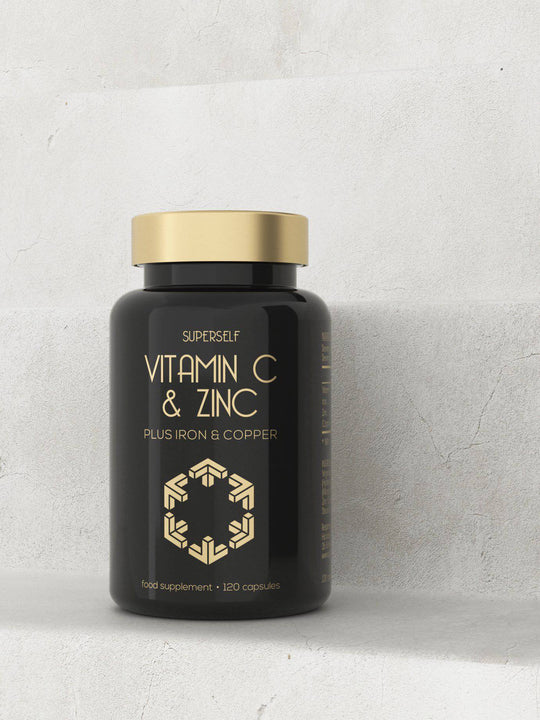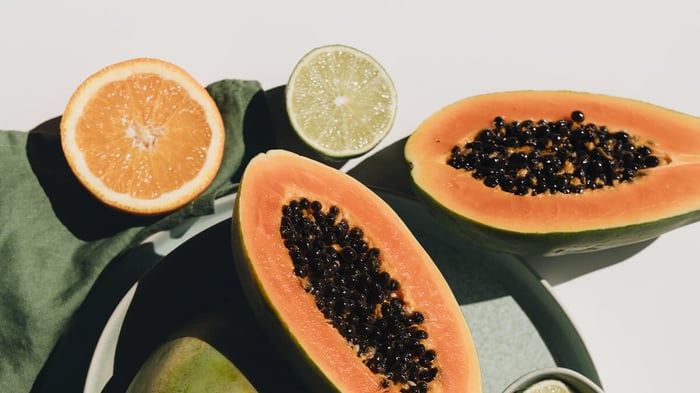Everyone knows that vitamin C is good for you, but why is it so important and how does it affect your health? Below we’ll cover nine key health benefits of vitamin C and discuss how to make sure you’re getting enough of the good stuff.
1. Vitamin C supports the immune system
Also known as ascorbic acid, vitamin C is well known to contribute to the normal functioning of the immune system. Studies show that it has a role in reducing inflammation, a precursor to many serious diseases.
2. Vitamin C helps maintain healthy skin and hair
By supporting the formation of collagen, vitamin C helps fight the visible signs of ageing from the inside out. Reduced levels of vitamin C are associated with skin damage by age or sunlight and research is investigating how skin creams with vitamin C may provide targeted help.
3. Vitamin C is a strong antioxidant
Free radicals are highly reactive molecules that damage cells. Antioxidants are the clean-up crew, neutralising free radicals and preventing more damage. Studies show that consuming extra vitamin C can increase blood antioxidant levels by up to 30%.
4. Vitamin C helps iron absorption
Iron is another essential nutrient and is used throughout the body. Vitamin C improves the uptake of iron in the gut, meaning that more of what we eat (or take as a supplement) is useful. This is particularly important for plant-based sources of iron, as they are typically less bioavailable than meat.
5. Vitamin C helps reduce tiredness and fatigue
Vitamin C contributes to the reduction of tiredness and fatigue. These common symptoms are also found in cases of vitamin C deficiency and respond well to vitamin C supplementation.
6. Vitamin C promotes wound healing
A clinical trial suggests that wounds, cuts, and grazes may heal faster in people with a high intake of vitamin C. When using high doses of vitamin C supplements in studies, researchers found increased collagen production and improved healing.
7. Vitamin C supports energy-yielding metabolism
Part of the process that converts food and drinks into energy ready to power our bodies, vitamin C also helps increase the absorption of other vitamins, minerals and nutrients.
8. Vitamin C helps maintain bones and cartilage
By helping our bodies make collagen (the building block for bones and cartilage), vitamin C plays a key role in the normal function and growth of bones, teeth, cartilage, skin and blood vessels. Studies suggest that high vitamin C intake is associated with lower bone loss and may protect against fractures.
9. Vitamin C supports gum and teeth health
Swollen and bleeding gums are a symptom of scurvy (severe vitamin C deficiency). Research suggests that adequate vitamin C intake can support healthy gums, as studies have shown a correlation between gum disease and low levels of vitamin C.
One myth: the magic vitamin
Vitamin C is an amazing, essential nutrient, and the more we uncover about how it works, the more fascinating it is. However, it is not a cure-all. Vitamin C does not cure cancer, AIDS or even the common cold. That doesn’t mean you shouldn’t make sure you get enough, though. This marvellous vitamin is a basic building block that helps you maintain your health and keep your body ready to fight off whatever comes your way, whether it’s the big C or a simple cold.
Vitamin C and Zinc with Iron & Copper - 120 Capsules

£9.90
£18.90
Combining a high-dose vitamin C and zinc supplement with iron and copper, these SuperSelf capsules provide a potent dietary supplement. 1000mg of vitamin C and 15mg of zinc per serving 14mg of iron and 1mcg of copper Designed to work together… Read More
How to get enough vitamin C
Vitamin C can’t be stored in the body, so a daily dose (the NHS recommends 40mg) is required through diet (it’s found in many fruits and vegetables) or a supplement. Smoking can decrease the uptake of vitamin C. The studies discussed above use various levels of vitamin C, and some research suggests the daily dose should be significantly higher than current recommendations. The NHS says “Taking less than 1,000mg of vitamin C supplements a day is unlikely to cause any harm.”
Read more:
https://www.nhs.uk/conditions/vitamins-and-minerals/vitamin-c/
https://efsa.onlinelibrary.wiley.com/doi/pdf/10.2903/j.efsa.2010.1815
https://pubmed.ncbi.nlm.nih.gov/8623000/


